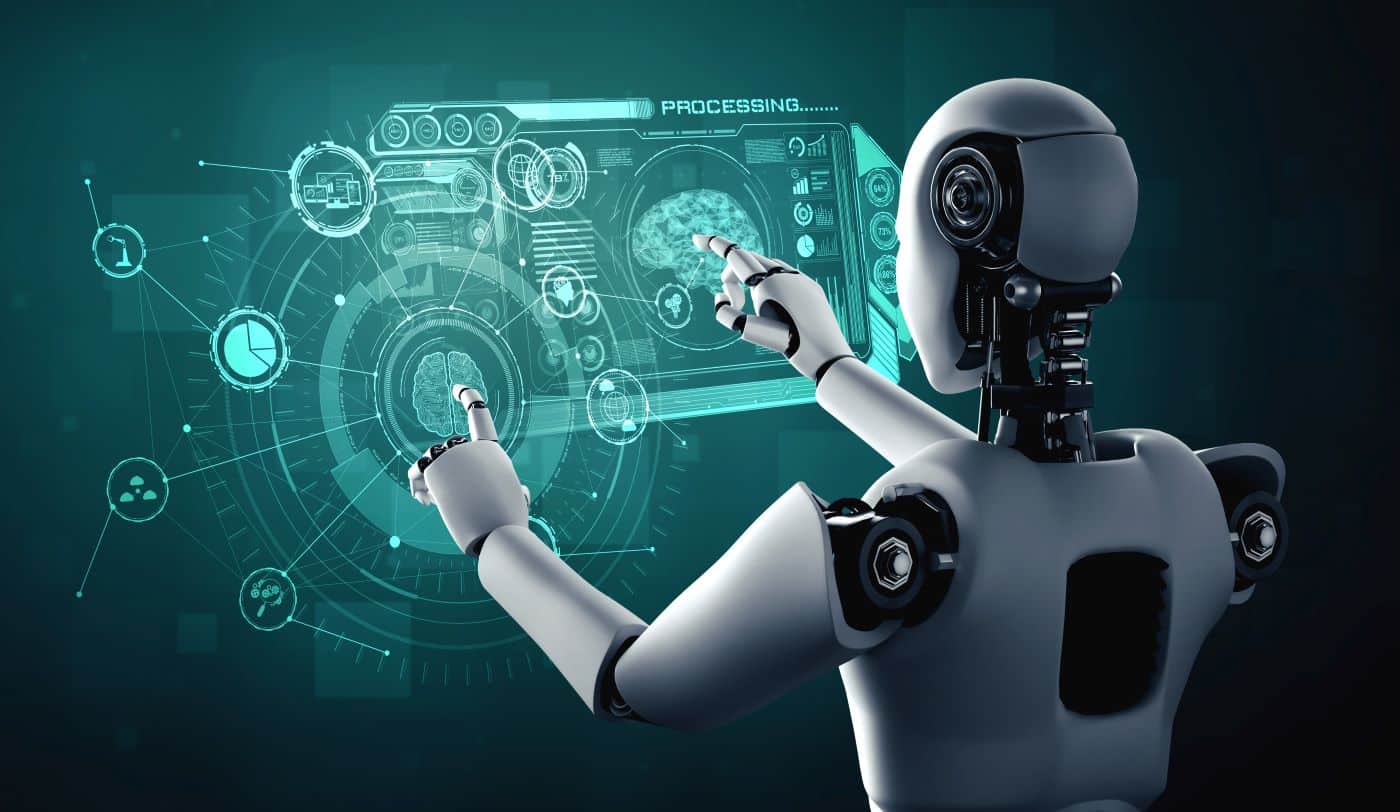
While the words Data Science, Artificial Intelligence, Machine Learning and Deep Learning are all related, they have distinct uses and meanings. Some of these areas may overlap, but each of these three words has its own distinct usages. This article presents a discussion on each of these concepts, why they are useful, and their use cases.
What is Artificial Intelligence
Artificial Intelligence (AI) is a field of study that is adept at simulating human intelligence using computer systems and iteratively improving themselves based on the information collected. It takes advantage of computer systems to mimic the problem-solving and decision-making skills that humans have.
Artificial Intelligence is quickly becoming the foundation of innovation. AI can bring value to your company by using predictions to automate extremely complicated or tedious activities and providing a more in-depth knowledge of the vast amount of data available. Artificial Intelligence’s use cases include natural language processing, expert systems, speech recognition, and so forth.
Benefits of Artificial Intelligence
Artificial Intelligence (AI) allows individuals to reconsider how we can combine information, analyze data, and utilize the derived insights to enhance decision making. The quantity of data generated by humans and computers today is extremely vast to consume, analyze and then come up with complicated decisions based on that data.
Artificial intelligence represents the future of all complicated decision making by providing a comprehensive understanding of the vast data available and automate complex tasks by relying on predictions. Some of the many use cases of Artificial Intelligence are fraud detection, Robotic Process Automation, virtual customer support, and so on.
What is Machine Learning?
Machine learning (ML) is a branch of Artificial Intelligence used for forecasting patterns and classifying and clustering data sets. It focuses on developing systems that can learn and keep improving from experience without being programmed explicitly. The execution of ML algorithms involves both data set processing and robots that deal with real-world data.
You can learn more about Machine Learning from an earlier article here.
What is Data Science?
Data Science is the practice of aggregating, cleansing, and modifying data to do advanced data analysis. Analytic applications and data scientists may then review the findings to identify trends and allow business leaders to make informed decisions.
Because virtually all types of companies nowadays generate exponential quantities of data all over the globe, monitoring and storing this data becomes challenging. Data Science is concerned with data modeling and data warehousing to keep up with the ever-increasing volume of data. Data Science applications take advantage of the information captured to drive business operations and achieve organizational goals.
Data Science is a vast area of research that focuses on data systems and processes to preserve data collections and extract meaning from them. It is an interdisciplinary area of study that uses data for various research and reporting objectives to extract insights and meaning from the data. Data Science requires a diverse set of abilities, including statistics, business savvy, and computer science.
To make sense of random data clusters, data scientists use various tools, applications, concepts, and algorithms. Data Scientists use various skills to evaluate the data collected from several sources to derive meaningful insights. They use data science to generate meaningful insights from data gathered from the web, cell phones, consumers, sensors, and other sources.
Benefits of Data Science
Unlike in the past, where data was more structured, today’s applications deal with massive unstructured or semi-structured data. This data comes from various sources such as log files, sensors, text files, etc. The BI tools are incapable of handling such vast volumes of data. Hence, we need advanced analytical tools and algorithms to process, analyze and decipher meaningful insights from the data. Here’s precisely where Data Science comes in. Some of the use cases of Data Science include predictive analysis, fraud detection, pattern recognition, etc.
Machine Learning and Data Science rely on each other for various applications since data is critical, and Machine Learning technologies are quickly becoming a crucial facet of most businesses.
What is Deep Learning?
Deep Learning is a subset of Machine Learning that focuses on deep neural networks. While Machine Learning leverages algorithms to analyze data, learn from it, train models, and make decisions, Deep Learning builds artificial neural networks capable of making cognitive decisions independently. The term comes from the fact that neural networks contain many deep layers. You can leverage Deep Learning to solve even the most complex problems using data that is both diverse and unstructured.
It should be noted that deep learning needs considerably more powerful hardware to operate on (primarily GPUs), takes much longer to train your models, and is usually more complex to implement than Machine Learning.
Read: Machine Learning vs Deep Learning: What’s the Difference?
When should I use Deep Learning?
Deep Learning (DL) is a stride forward in machine learning. Even while ML is very effective in most applications, there are certain instances where it falls short. This is where deep learning comes into play. It is often assumed that if your training dataset is relatively small, you should use ML. However, if you have a large quantity of data to train a model and if the data is diverse and critical, you should choose deep learning.
What is Data Mining? Why Does It Matter?
Data Mining is primarily concerned with the methods and tools used to uncover previously undiscovered patterns in data and make it more useful for study. It is a collection of methods and tools that scientists and researchers use to extract new and potentially insightful information from vast amounts of previously unknown data and convert it into consumable structures for future use.
Data Mining may be used to predict and identify patterns in a variety of business areas. It is a proactive solution for companies seeking a competitive advantage. Data mining enables us to make intelligent market decisions, conduct accurate campaigns, create forecasts, and more.
Differences Between AI, ML, DL, Data Science, and Data Mining
Let’s now summarize all we learnt thus far. The following points define AI, ML, Data Science, Deep Learning and Data Mining in brief.
- Artificial Intelligence is a concept that can mimic human intelligence providing cognitive and intellectual abilities to computer systems and iteratively improve themselves over time using the data gathered.
- Machine Learning is a subset of Artificial Intelligence that uses supervised, unsupervised, and reinforcement learning approaches to provide a way for computer systems to learn from experience and improve over time.
- Data Science deals with huge data sets and takes advantage of mathematics, statistics, data wrangling, big data analytics, and machine learning to help make decisions and plan to meet an organization’s goals and objectives.
- Deep Learning is a branch of machine learning that takes advantage of complex algorithms and makes intelligent decisions independently.
- Data Mining is defined as a collection of methods and tools for gathering, cleaning, and analyzing data to uncover intriguing patterns and trends.


